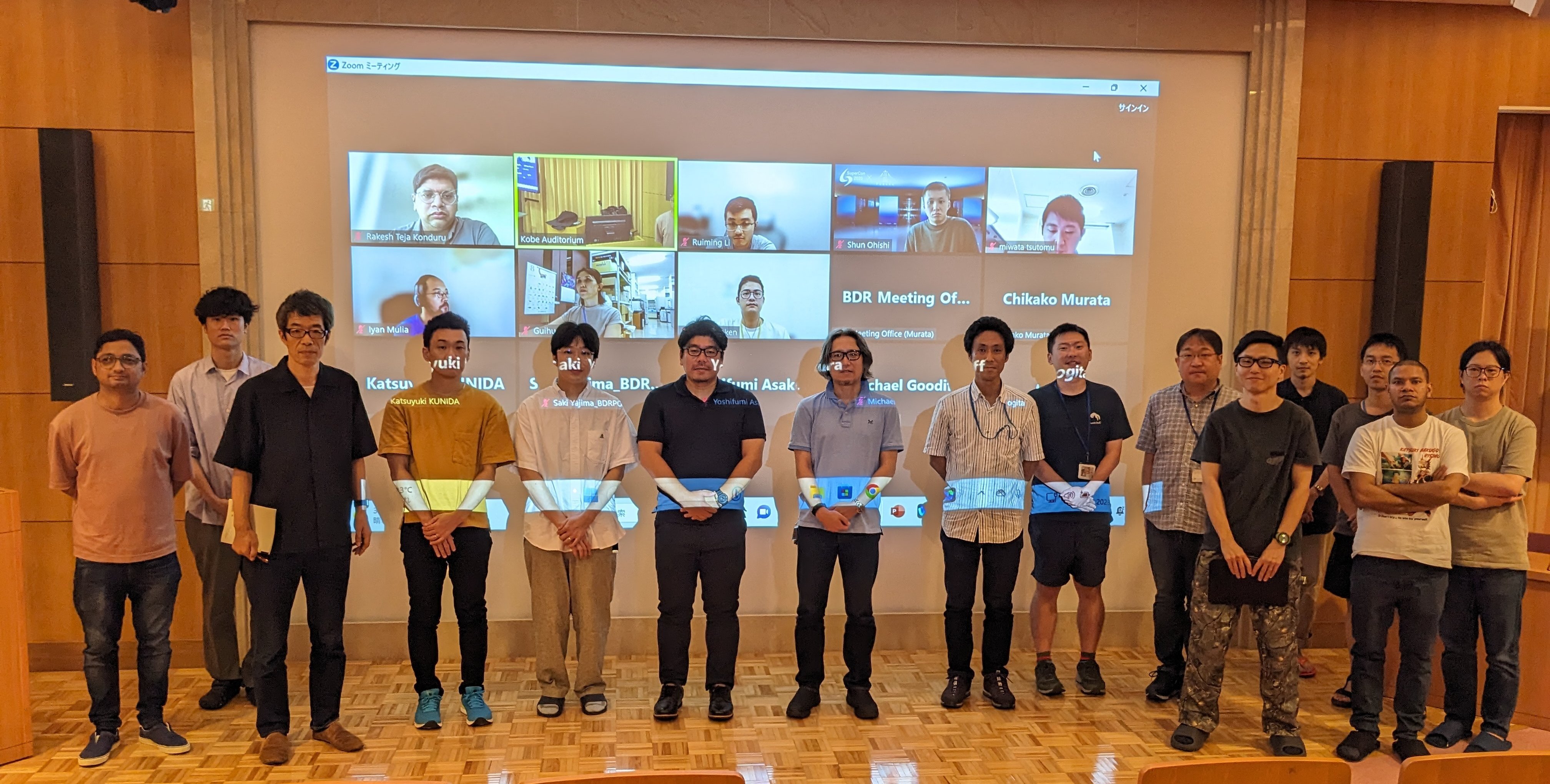
The 19th Prediction Science Seminar was held on 19 September 2023 (Tuesday), 15:00–16:30 (JST), and was presented by Dr. Katsuyuki Kunida from Fujita Health University (6th from the left in the picture).
In his talk, he presented his recent work on analyzing signaling activity during cell migration [Kunida et al., 2023]. Migration is an essential feature of cells and is controlled by the activity of Rho family proteins: Rho, Cdc42, and Rac. Although recent gene engineering enables us to observe the activity of these proteins one by one, it is still technically challenging to do that simultaneously.
To overcome this technical difficulty, Dr. Kunida and his colleagues developed the motion-triggered average (MTA) algorithm. The MTA algorithm consists of three steps: classification of velocity patterns of cell deformation, removal of intracellular noise, and removal of cell-to-cell variation. Through the MTA algorithm, we can obtain the quantitative relationship between cell deformation and the activity of the multiple Rho family proteins. The MTA algorithm found the characteristic activity patterns of Rho family proteins that induce various types of cell deformation, such as low expansion and low deceleration. Then, they conducted a regression analysis, and their regression equation accurately predicted the cell deformation from the activity patterns of Rho family proteins, suggesting that the regression equation reflects the general rule of cell deformation. Overall, the MTA algorithm enables data-driven model identification of complex regulation during cell deformation. In the last part of the seminar, he introduced the future direction of the study using the data assimilation technique. After his presentation, we had a fruitful discussion about the technical details and prospects of the research.
Reference
Kunida K, Takagi N, Aoki K, Ikeda K, Nakamura T, Sakumura Y. Decoding cellular deformation from pseudo-simultaneously observed Rho GTPase activities. Cell Rep. 2023 Feb 28;42(2):112071. doi: 10.1016/j.celrep.2023.112071. Epub 2023 Feb 9. PMID: 36764299.
In his talk, he presented his recent work on analyzing signaling activity during cell migration [Kunida et al., 2023]. Migration is an essential feature of cells and is controlled by the activity of Rho family proteins: Rho, Cdc42, and Rac. Although recent gene engineering enables us to observe the activity of these proteins one by one, it is still technically challenging to do that simultaneously.
To overcome this technical difficulty, Dr. Kunida and his colleagues developed the motion-triggered average (MTA) algorithm. The MTA algorithm consists of three steps: classification of velocity patterns of cell deformation, removal of intracellular noise, and removal of cell-to-cell variation. Through the MTA algorithm, we can obtain the quantitative relationship between cell deformation and the activity of the multiple Rho family proteins. The MTA algorithm found the characteristic activity patterns of Rho family proteins that induce various types of cell deformation, such as low expansion and low deceleration. Then, they conducted a regression analysis, and their regression equation accurately predicted the cell deformation from the activity patterns of Rho family proteins, suggesting that the regression equation reflects the general rule of cell deformation. Overall, the MTA algorithm enables data-driven model identification of complex regulation during cell deformation. In the last part of the seminar, he introduced the future direction of the study using the data assimilation technique. After his presentation, we had a fruitful discussion about the technical details and prospects of the research.
Reference
Kunida K, Takagi N, Aoki K, Ikeda K, Nakamura T, Sakumura Y. Decoding cellular deformation from pseudo-simultaneously observed Rho GTPase activities. Cell Rep. 2023 Feb 28;42(2):112071. doi: 10.1016/j.celrep.2023.112071. Epub 2023 Feb 9. PMID: 36764299.

